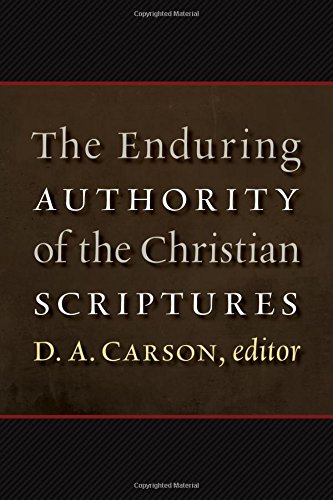The definitive evangelical reference work on the nature and authority of the Bible.
In this volume thirty-seven first-rate scholars present a thorough study of biblical authority and a full range of issues connected to it.
Recognizing that Scripture and its authority are now being both challenged and defended with renewed vigor, editor D. A. Carson assigned the topics that these select scholars address in the book. After an introduction by Carson to the many facets of the current discussion, the contributors present robust essays on relevant historical, biblical, theological, philosophical, epistemological, and comparative-religions topics. To conclude, Carson answers a number of frequently asked questions about the nature of Scripture, cross-referencing these FAQs to the preceding chapters.
This comprehensive volume by a team of recognized experts will be the go-to resource on Scriptural meaning and authority.
Contents:
Introduction — D. A. Carson
Section 1: Historical Topics
Contributors: Charles E. Hill, Robert Kolb, Rodney L. Stiling, John D. Woodbridge, Thomas H. McCall, Bradley N. Seeman, Glenn N. Sunshine, David Gibson, and Anthony N. S. Lane
Section 2: Biblical and Theological Topics
Contributors: Stephen G. Dempster, V. Philips Long, Peter J. Williams, Simon Gathercole, Graham A. Cole, Peter F. Jensen, Henri A. G. Blocher, Bruce K. Waltke, Barry G. Webb, Mark D. Thompson, Osvaldo Padilla, Craig L. Blomberg, Douglas J. Moo, Andrew David Naselli, and Kevin J. Vanhoozer
Section 3: Philosophical and Epistemological Topics
Contributors: James Beilby, R. Scott Smith, Michael C. Rea, Paul Helm, Richard Lints, and Kirsten Birkett
Section 4: Comparative Religions Topics
Contributors: Te-Li Lau, Ida Glaser, Timothy C. Tennent, Harold Netland, and Alex G. Smith
Thinking Holistically — Daniel M. Doriani
FAQs — D. A. Carson
From the editor, D. A. Carson:
Enduring Authority is a substantial edited book of thirty-seven essays that reflect on a wide variety of facets regarding the nature of Scripture: what we mean by revelation, how we are to think of the way both God and human beings are involved in the production of Scripture, how the nature and truthfulness of Scripture have been understood at various periods of church history, and many other topics.
The list of contributors is impressive. Moreover, they came together when their work was in draft form for an intense week of mutual interaction and criticism, ensuring that the end result is stronger than it would have been without the mutual critique. In short, our aim was to produce a comprehensive volume that would be a touchstone on the subject for the twenty-first century.
Read more in Carson’s interview here on Books At a Glance.
